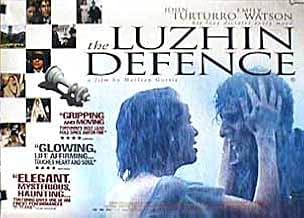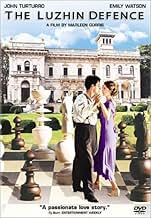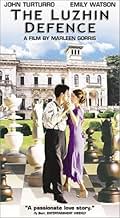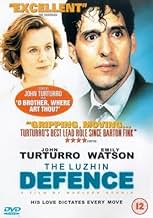VALUTAZIONE IMDb
6,8/10
4947
LA TUA VALUTAZIONE
Aggiungi una trama nella tua linguaTwo worlds collide when an eccentric genius falls in love with a strong-willed society beauty.Two worlds collide when an eccentric genius falls in love with a strong-willed society beauty.Two worlds collide when an eccentric genius falls in love with a strong-willed society beauty.
- Regia
- Sceneggiatura
- Star
- Premi
- 3 vittorie e 2 candidature totali
Recensioni in evidenza
Albeit excellent in cinematography and actors' work, the movie stunned me by its almost complete unrelatedness to the famous (and one of the best) novel by Vladimir Nabokov. All the plot lines are put topsy-turvy, the spectacular intricacy of the plot is revealed in a straight line and all the intellectual play of Nabokov with the reader (false clues, not telling the reader the main character's first and middle name until the very last page of the novel, etc) are all gone from the film. The movie's ending is hilariously hollywoodish (and, of course, has nothing to do with the novel again). In one word, one can watch it if one hates Nabokov and has a penchant for twisted originals.
Part of the enjoyment that I took from this film stemmed from the fact that I knew nothing more about it than that it starred John Turturro and Emily Watson (2 reasons enough to watch), was a period piece and involved chess. Everything that evolved before me was completely unexpected. I shan't, therefore, give away much more. Suffice to say that Turturro is magnificent as an eccentric, obsessive and deeply vulnerable chess genius and Em matches him step for step as the strong-minded woman who is drawn to him. It's about love and obsession, rather than the venerated board game and after drawing me in gradually over the first half hour, became totally compelling. And I defy anyone to second-guess the ending.
Alexandr "Sascha" Luzhin (John Turturro) is a former leading chess player attempting a comeback at an Italy-hosted tournament. His brilliance is unquestioned but his obsession with chess has stunted his growth in all other aspects of his life. Natalia (Emily Watson) is a beautiful heiress who has come to the same resort with her mother, Vera (Geraldine James) to scope out possible marriage partners. Vera leans toward a handsome count but, astonishingly, Natalia is more fascinated by Sascha, whom she met on a walk. Sascha, too, is taken with Natalia and proposes marriage at their second meeting. But, with the concentration that Sascha must give to the chess matches and, with other happenings in his past still causing problems, will he win the heart of Natalia? Oh, and can he become the chess champion, also? This is a lovely film, based on a novel by Nabokov. The acting is amazing, with Watson very fine as the beautiful little rich girl and Turturro utter perfection as the shy, awkward chess enthusiast. James gives quite a nice turn as the overbearing mother and the other cast members are wonderful as well. As for the look of the film, it could not be better. The scenery is of the put-your-eye-out variety, the vintage costumes are gorgeous and the cinematography is deserving of much applause. Yes, the story is unusual and told with the use of flashbacks, at times, making it a film not everyone will appreciate. Then, too, the ending is bittersweet. However, if you love romance, period pieces, great acting, knockout scenery, or the fine art of motion picture creation, don't miss this one. You will be defenseless in resisting its multitude of charms.
Walking home after the film, I was humming the familiar waltz music that Natalia and Alexandre were dancing to. I've heard that before - where? Ah, from Kubrick's "Eyes Wide Shut" (track 2), 'got it just as I arrived at the door. It's "Waltz No. 2 from Jazz Suite No. 2" composed by Dimitri Shostakovich, performed here by The City of Prague Philharmonic Orchestra. Yes, I went and picked up the soundtrack from Tower's. What a treat! The film score by Alexandre Desplat was fulfilling - there are fifteen tracks besides two tracks of the delightful waltz. It's not often these days we get a soundtrack entirely dedicated to a comprehensive film score. Reminds me of favorite scores by Maurice Jarre, Ennio Morricone (beginning notes of track 6 have traces of "Nuovo cinema Paradiso"), Georges Delerue, and John Barry. There are subtle nuances of strains and notes from the strings, celeste, piano, and harp.
Emily Watson and John Turturro delivered a credibly consuming paired performance. The love story, their intimate connection, is very much between Alexandre and Natalia - his childlike yet tormenting inner world, and her generous and bold understanding of him - a relationship alone to them both. Director Marleen Gorris of "Antonia's Line" (1996 Academy Award's Best Foreign Language Film from the Netherlands) gave us a quietly sensitive film - not without its unsettling human conflicts, intrigues, obsessions, family strives, lovingness and respect. The front-end subject is the mind-game and mathematical logic of chess. Beneath it can be a mild tearjerker of a drama set in the late 1920's. Cinematography captures the serene beauty of Lake Como in northern Italy near the Swiss border.
I highly recommend the soundtrack if you don't feel like going to the movies. Alexandre Desplat's lyrical film score of "The Luzhin Defence" is complete.
Emily Watson and John Turturro delivered a credibly consuming paired performance. The love story, their intimate connection, is very much between Alexandre and Natalia - his childlike yet tormenting inner world, and her generous and bold understanding of him - a relationship alone to them both. Director Marleen Gorris of "Antonia's Line" (1996 Academy Award's Best Foreign Language Film from the Netherlands) gave us a quietly sensitive film - not without its unsettling human conflicts, intrigues, obsessions, family strives, lovingness and respect. The front-end subject is the mind-game and mathematical logic of chess. Beneath it can be a mild tearjerker of a drama set in the late 1920's. Cinematography captures the serene beauty of Lake Como in northern Italy near the Swiss border.
I highly recommend the soundtrack if you don't feel like going to the movies. Alexandre Desplat's lyrical film score of "The Luzhin Defence" is complete.
John Turturro, Emily Watson, Geraldine James, Stuart Wilson; directed by Marleen Gorris, loosely based on the novel by Vladimir Nabokov The Luzhin Defence is set in nineteen-twenties Italy's lake district where the world championships of Chess are being staged. Our hero Luzhin (Turturro) is a main contender for the title and recognized as one of the greatest chess minds of the era. He is utterly consumed by game, and has utterly devoted his life to the contest since a young age. It has been both obsession and addiction for the man, as it is both all he knows and what gives his life meaning. While competing in the championships, he meets Natalia (Watson), a wealthy socialite. Showing his peculiarity, he immediately asks her to marry him, sight unseen. Intrigued by his straight forward manner, she does not immediately dismiss him.
This is due to the fact that she is here for her mother to choose a suitor for her, and Luzhin's eccentricity is seen by her as a welcome change. Her mother (James) is completely taken aback by such an idea, and wants her daughter to marry someone of similar prestige and means. All of this transpires while his old chess teacher (Wilson) tutors his chief rival, wanting nothing more than to see Luzhin humiliated.
Being a chess movie, it could immediately be set aside as dull and unwatchable, being as Chess is not exactly a spectator sport.
However, this movie is much less about chess and much more about the people surrounding the game; making it a piece about the interactions of personalities and not pieces. The movie does find a parallel however, as it is shown like a chess match between two sides, the present and the past (shown through flashbacks), with one side prevailing at the end. This storytelling choice works surprisingly well, as we gain much insight as to why Luzhin is the way he is, and how he views the world.
The movie begins with a telling piece of cinematography, as the audience is given the perspective of a train conductor emerging from a tunnel. This is especially significant when viewed in the sense of Luzhin's later mental breakdown, and can be seen as meaning the same thing. This scene is then segued into the first flashback, giving us a pattern that can be seen in the rest of the film. Other notable scenes include the meeting of Natlalia and Alexander at a tennis court, and later when he is thinking to himself in their bedroom, "There is a pattern emerging!" cries the eccentric chess genius Alexander Luzhin. "I must keep track--every second!" To which Natalia, whom he loves can only reply, "It sounds like such a lonely battle.' This all encompassing effect of chess on him can also be seen earlier in the film, as he is being driven by one of his old chess teachers chauffeurs into the middle of the countryside, is dropped off there, and does not notice. The end adds character to the film without being overly dramatic, but is a departure from the finish of the novel, however it is believable and adds to the sense that Luzhin does not really control himself, or know how.
Overall an enjoying piece of film, more about camera angles and people then chess. After the first half, the films pace drastically speeds up, and the plot becomes much more intriguing. Can best be compared to other independent films of its ilk, yet also suffices quite well as a period piece. Probably not a buy, but a worthy rental for an evening at home.
This is due to the fact that she is here for her mother to choose a suitor for her, and Luzhin's eccentricity is seen by her as a welcome change. Her mother (James) is completely taken aback by such an idea, and wants her daughter to marry someone of similar prestige and means. All of this transpires while his old chess teacher (Wilson) tutors his chief rival, wanting nothing more than to see Luzhin humiliated.
Being a chess movie, it could immediately be set aside as dull and unwatchable, being as Chess is not exactly a spectator sport.
However, this movie is much less about chess and much more about the people surrounding the game; making it a piece about the interactions of personalities and not pieces. The movie does find a parallel however, as it is shown like a chess match between two sides, the present and the past (shown through flashbacks), with one side prevailing at the end. This storytelling choice works surprisingly well, as we gain much insight as to why Luzhin is the way he is, and how he views the world.
The movie begins with a telling piece of cinematography, as the audience is given the perspective of a train conductor emerging from a tunnel. This is especially significant when viewed in the sense of Luzhin's later mental breakdown, and can be seen as meaning the same thing. This scene is then segued into the first flashback, giving us a pattern that can be seen in the rest of the film. Other notable scenes include the meeting of Natlalia and Alexander at a tennis court, and later when he is thinking to himself in their bedroom, "There is a pattern emerging!" cries the eccentric chess genius Alexander Luzhin. "I must keep track--every second!" To which Natalia, whom he loves can only reply, "It sounds like such a lonely battle.' This all encompassing effect of chess on him can also be seen earlier in the film, as he is being driven by one of his old chess teachers chauffeurs into the middle of the countryside, is dropped off there, and does not notice. The end adds character to the film without being overly dramatic, but is a departure from the finish of the novel, however it is believable and adds to the sense that Luzhin does not really control himself, or know how.
Overall an enjoying piece of film, more about camera angles and people then chess. After the first half, the films pace drastically speeds up, and the plot becomes much more intriguing. Can best be compared to other independent films of its ilk, yet also suffices quite well as a period piece. Probably not a buy, but a worthy rental for an evening at home.
Lo sapevi?
- QuizLa partita - La difesa di Luzhin (2000) was shot entirely in Europe. Budapest, Hungary was used for outdoor scenes as they were set in St Petersburg, these included the Széchenyi Chain Bridge, Hungarian National Museum and Heroes' Square. The chess tournament (although in Italy) was shot inside the main hall of the Museum of Ethnography, Budapest. In Italy, the hotel scenes were filmed at Villa Erba, Cernobbio, on the Lake Como. The scene at the railway station is in Brenna-Alzate, near Como.
- BlooperIn his game as white against an unnamed opponent before the final, Luzhin is shown supposedly checkmating with Rd1-d8, which is an illegal move because his rook at d1 is pinned against his king on h1 by black's rook at c1.
- Citazioni
Aleksandr Ivanovich Luzhin: There's a pattern emerging, a definite pattern. Not Turati. I repeat that game. I've beaten him. And his moves are repeated, repeated, repeated moves. I must keep track... of every second. Every second I must keep track of, every second.
Natalia Katkov: It sounds like such a lonely battle.
- Colonne sonoreJazz Suite No. 2: VI. Waltz 2
Written by Dmitri Shostakovich (as Dimitri Shostakovich)
Performed by Koninklijk Concertgebouworkest (as Royal Concertgebouw Orchestra)
Conducted by Riccardo Chailly
By permission of Boosey & Hawkes Licensing
Courtesy of Decca Record Label Ltd.
Under license from Universal Special Markets
(p) 1992 Decca Records
I più visti
Accedi per valutare e creare un elenco di titoli salvati per ottenere consigli personalizzati
- How long is The Luzhin Defence?Powered by Alexa
Dettagli
- Data di uscita
- Paesi di origine
- Lingue
- Celebre anche come
- The Luzhin Defence
- Luoghi delle riprese
- Budapest, Ungheria(St Petersburg scenes)
- Aziende produttrici
- Vedi altri crediti dell’azienda su IMDbPro
Botteghino
- Lordo Stati Uniti e Canada
- 1.053.070 USD
- Fine settimana di apertura Stati Uniti e Canada
- 63.203 USD
- 22 apr 2001
- Lordo in tutto il mondo
- 1.873.620 USD
- Tempo di esecuzione1 ora 49 minuti
- Colore
- Mix di suoni
- Proporzioni
- 1.85 : 1
Contribuisci a questa pagina
Suggerisci una modifica o aggiungi i contenuti mancanti

Divario superiore
By what name was La partita - La difesa di Luzhin (2000) officially released in India in English?
Rispondi





























